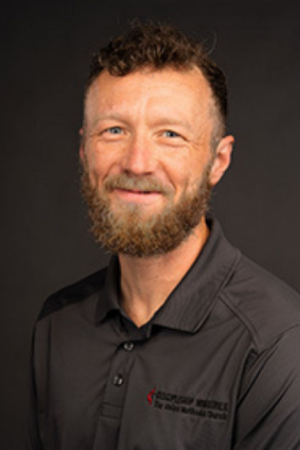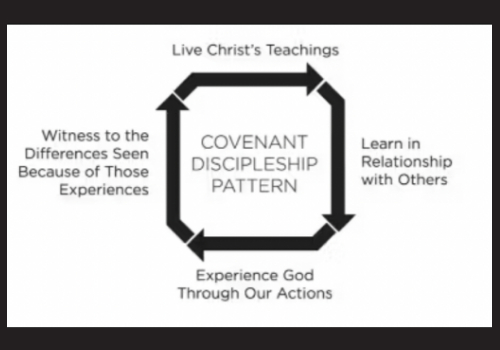
Annual Conference workshop: Everyday Disciples

Chris Wilterdink, United Methodist Discipleship Ministries
During the Lunch-n-Learn sessions at the 2025 Annual Conference, Chris Wilterdink shared his expansive knowledge in a workshop titled "Everyday Disciples - Balancing Vocation and Accountability."
Chris Wilterdink has worked for Discipleship Ministries for fifteen years and currently serves as the Executive Director for Congregational Vitality and International Discipleship. His passions lie in the ministries of local churches and, more specifically, in youth and young adult ministry. He is also the Director for Young People's Ministry, which aims to help coordinate resources and train those who work with youth and young adults across our denomination.
He began the session by asking the participants, "In what times of life do you and your church typically have conversations about vocation?"
Although the answers were somewhat varied, the high school and post-high school stages of life were common seasons for conversations about vocation. Wilterdink mentioned that this was on par with the results from the different conferences he had polled with similar questions.
Wilterdink emphasized that it's essential to be able to discuss vocation with every age level.
"Developmentally, when you're an elementary schooler and when you're in middle school, you still want to be doing stuff that matters and things that are interesting to you," he explained. "As we get on towards other parts of life and early professional midlife, I think the conversations about vocations and the things that we do that have meaning in our lives is equally as important as those high school and college years."
Wilterdink connected this need with discipleship.
"When we're talking about discipleship or discipleship practice, doing little things every day and being part of accountability groups is a part of the recipe for being able to talk through vocation and how we move on towards Christan perfection," he added.
Wilterdink acknowledged that discipleship may feel more challenging due to the decline in church membership and activity within the local church. This reality will necessitate that churches reassess their approach to discipleship.
"We have to be willing to meet people where they are," Wilterdink insisted. "If we're going to ask them to be trying out spiritual practices or being part of bible studies, prayer groups, those kinds of things, we have to find times that work and places that work and not just expect people to come into our church for spiritual experiences to happen."
When considering different ways to expand the reach of your ministry, Wilterdink advises trying to understand the "dones."

"Many individuals leaving mainline churches don't end up abandoning faith altogether but instead start to seek spiritual fulfillment outside traditional church structures," he explained. "Just because someone has decided not to connect themselves to a church does not mean they are not curious anymore. It also doesn't mean that they aren't still growing, and it definitely doesn't mean that God is done with them in any way."
If you want to reach those people, you need to find ways to break out of the walls of your church. It's about going out and finding people, meeting their needs, not just waiting for them to walk through your doors.
Wilterdink highlighted a few key reasons that Discipleship Ministries believes people leave the church or don't want to be connected to a church. One reason that the participants resonated with, in particular, was the "Desire for Authentic Community."
Wilterdink described this reason as "a longing for deeper, more meaningful connections than what is found in a traditional congregation. They want something more than just going through the motions."
"When we talk about things like feeling irrelevant, desire for authentic community, disillusionment, and church polity, we're really asking people to trust in something. We live in an era when it is challenging to develop trust. Due to misinformation, disinformation, and the social networks we end up being a part of, it's really hard to know what's true and what's not, what relationships are valuable and which ones aren't."
"I would make the case that as part of being disciples, as part of the spiritual practices that we want to take on, we really want to be able to try to build relationships through basically everything that we do," he added.
The group then discussed Wesley's theology of small groups in the local church. John Wesley said, "Each small group within a church was designed to inspire relationships with accountability for church members to keep living godly lives."
To help reclaim this discipleship model, Wilterdink presented a concept known as the "covenant discipleship pattern." "The basic idea is that there is a circular process that all of us engage in. We are constantly learning. We are constantly having opportunities to not only transform ourselves but transform the world because of our discipleship," explained Wilterdink.
The image does not have specific steps. It is also not in a linear pattern or numbered in order; it is a continuous loop. We continually experience different stages in the cycle and grow from each of them.

To support this covenant discipleship, Wilterdink referenced the Wesleyan foundational concepts of "Works of Mercy" and "Works of Piety, both "Personal" and "Public," as means by which relational discipleship can happen.
"We have a tendency to do the things that are most familiar to us or most comfortable for us," explained Wilterdink. "For me, reading, meditating, and studying scripture are all easy works of piety for me to continue to do. If I've never had the opportunity to fast, I would need somebody that I'm in a trusted group or a discipleship connection with to teach me how that goes and to process how I'm feeling when doing that fasting."
Undergirding the intentionality of exploring new spiritual practices are the questions of identity, belonging, and purpose. The church should be a place where people can truly learn who they are, feel a sense of belonging, and understand a greater purpose for their lives.
"How does having open hearts, open minds, and open doors affect somebody's sense of belonging?" Wilterdink asked. "If we say that we've got open hearts, open minds, open doors, and then the person's experience is not that, then all of a sudden that's a barrier to relationships or a barrier to connection that interferes with the ability to grow and the ability to be transformed. So we want to offer opportunities for people to belong."
In developing systems of discipleship within our church, Wilterdink emphasized the three "must dos": recognizing spiritual maturity, demonstrating the Great Commandment, and practicing theology.
First, we need to create ways to recognize and celebrate spiritual maturity.
"If you have a discipleship ministry or a discipleship pathway of some kind, not only can you encourage people to walk along that and reflect upon their journey, but be willing to share some testimonies and some stories that happened and celebrate as somebody hits milestones in their journey," advised Wilterdink.
Secondly, always live the Great Commandment.
"Demonstrate love for God, demonstrate love for neighbor. Do that as much as anything else. Make sure that God and neighbor are part of the story that you get to tell and the opportunities that you build," said Wilterdink.
Finally, allow spaces for people to practice their theology.
"We all learn by practicing," Wilterdink said. "If we say things that we believe, you have to be able to give people the opportunity to practice those things and then reflect on what they learned because of the experience."
View the PowerPoint presentation from this workshop here and the video recording here.